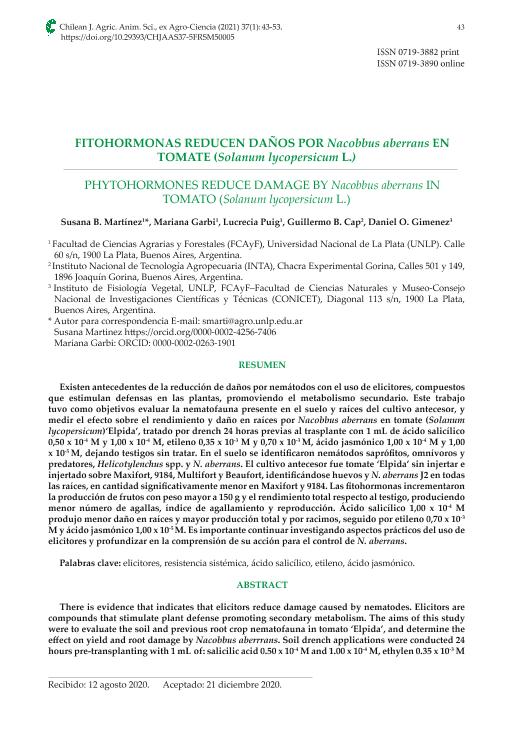Mostrar el registro sencillo del ítem
dc.contributor.author
Martinez, Susana
dc.contributor.author
Garbi, Mariana

dc.contributor.author
Puig, Maria Lucrecia

dc.contributor.author
Cap, Guillermo
dc.contributor.author
Gimenez, Daniel
dc.date.available
2022-05-30T18:00:33Z
dc.date.issued
2021-04
dc.identifier.citation
Martinez, Susana; Garbi, Mariana; Puig, Maria Lucrecia; Cap, Guillermo; Gimenez, Daniel; Fitohormonas reducen daños por Nacobbus aberrans en tomate (Solanum lycopersicum L.); Universidad de Concepción; Chilean Journal of Agricultural and Animal Sciences; 37; 1; 4-2021; 43-53
dc.identifier.issn
0719-3882
dc.identifier.uri
http://hdl.handle.net/11336/158506
dc.description.abstract
Existen antecedentes de la reducción de daños por nemátodos con el uso de elicitores, compuestos que estimulan defensas en las plantas, promoviendo el metabolismo secundario. Este trabajo tuvo como objetivos evaluar la nematofauna presente en el suelo y raíces del cultivo antecesor, y medir el efecto sobre el rendimiento y daño en raíces por Nacobbus aberrans en tomate (Solanum lycopersicum)‘Elpida’, tratado por drench 24 horas previas al trasplante con 1 mL de ácido salicílico 0,50 x 10-4 M y 1,00 x 10-4 M, etileno 0,35 x 10-3 M y 0,70 x 10-3 M, ácido jasmónico 1,00 x 10-4 M y 1,00 x 10-5 M, dejando testigos sin tratar. En el suelo se identificaron nemátodos saprófitos, omnívoros y predatores, Helicotylenchus spp. y N. aberrans. El cultivo antecesor fue tomate ‘Elpida’ sin injertar e injertado sobre Maxifort, 9184, Multifort y Beaufort, identificándose huevos y N. aberrans J2 en todas las raíces, en cantidad significativamente menor en Maxifort y 9184. Las fitohormonas incrementaron la producción de frutos con peso mayor a 150 g y el rendimiento total respecto al testigo, produciendo menor número de agallas, índice de agallamiento y reproducción. Ácido salicílico 1,00 x 10-4 M produjo menor daño en raíces y mayor producción total y por racimos, seguido por etileno 0,70 x 10-3 M y ácido jasmónico 1,00 x 10-5 M. Es importante continuar investigando aspectos prácticos del uso de elicitores y profundizar en la comprensión de su acción para el control de N. aberrans.
dc.description.abstract
There is evidence that indicates that elicitors reduce damage caused by nematodes. Elicitors are compounds that stimulate plant defense promoting secondary metabolism. The aims of this study were to evaluate the soil and previous root crop nematofauna in tomato ‘Elpida’, and determine the effect on yield and root damage by Nacobbus aberrrans. Soil drench applications were conducted 24 hours pre-transplanting with 1 mL of: salicilic acid 0.50 x 10-4 M and 1.00 x 10-4 M, ethylen 0.35 x 10-3 M and 0.70 x 10-3 M, jasmonic acid 1.00 x 10-4 M and 1.00 x 10-5 M, including untreated plants as control. In the soil, saprophytic, omnivorous and predatory nematodes, as well as Helicotylenchus spp. and N. aberrans, were identified. The previous crop was ungrafted ‘Elpida’ plants and also grafted on Maxifort, 9184, Multifort and Beaufort. Eggs and N. aberrans J2 were identified in all roots, with significantly lower amounts in Maxifort and 9184. Phytohormones increased the production of fruits with weight higher than 150 g and total yield compared to the control, producing lower galls, galling and reproductive indexes. Salicylic acid 1.00 x 10-4 M produced lower damage to the roots and a higher total yield and truss yield, followed by ethylene 0.70 x 10-3 M and jasmonic acid 1.00 x 10-5 M treatments. Further research is required to provide deeper knowledge of the practical implications of using elicitors and enhance the understanding of their action for N. aberrans control.
dc.format
application/pdf
dc.language.iso
spa
dc.publisher
Universidad de Concepción
dc.rights
info:eu-repo/semantics/openAccess
dc.rights.uri
https://creativecommons.org/licenses/by-nc-sa/2.5/ar/
dc.subject
ELICITORS
dc.subject
SYSTEMIC RESISTANCE
dc.subject
SALICYLIC ACID
dc.subject
ETHYLENE
dc.subject
JASMONIC ACID
dc.subject.classification
Horticultura, Viticultura

dc.subject.classification
Agricultura, Silvicultura y Pesca

dc.subject.classification
CIENCIAS AGRÍCOLAS

dc.title
Fitohormonas reducen daños por Nacobbus aberrans en tomate (Solanum lycopersicum L.)
dc.title
Phytohormones reduce damage by Nacobbus aberrans in tomato (Solanum lycopersicum L.)
dc.type
info:eu-repo/semantics/article
dc.type
info:ar-repo/semantics/artículo
dc.type
info:eu-repo/semantics/publishedVersion
dc.date.updated
2022-04-26T20:24:18Z
dc.identifier.eissn
0719-3890
dc.journal.volume
37
dc.journal.number
1
dc.journal.pagination
43-53
dc.journal.pais
Chile

dc.journal.ciudad
Concepción
dc.description.fil
Fil: Martinez, Susana. Universidad Nacional de La Plata. Facultad de Ciencias Agrarias y Forestales; Argentina
dc.description.fil
Fil: Garbi, Mariana. Universidad Nacional de La Plata. Facultad de Ciencias Agrarias y Forestales; Argentina
dc.description.fil
Fil: Puig, Maria Lucrecia. Universidad Nacional de La Plata. Facultad de Ciencias Agrarias y Forestales; Argentina. Consejo Nacional de Investigaciones Científicas y Técnicas. Centro Científico Tecnológico Conicet - La Plata; Argentina
dc.description.fil
Fil: Cap, Guillermo. Gobierno de la Provincia de Buenos Aires. Ministerio de Desarrollo Agrario. Chacra Experimental Gorina.; Argentina. Instituto Nacional de Tecnología Agropecuaria; Argentina
dc.description.fil
Fil: Gimenez, Daniel. Consejo Nacional de Investigaciones Científicas y Técnicas. Centro Científico Tecnológico Conicet - La Plata. Instituto de Fisiología Vegetal. Universidad Nacional de La Plata. Facultad de Ciencias Naturales y Museo. Instituto de Fisiología Vegetal; Argentina
dc.journal.title
Chilean Journal of Agricultural and Animal Sciences
dc.relation.alternativeid
info:eu-repo/semantics/altIdentifier/url/http://agro-ciencia.cl/web/2021/04/21/abstract-37-1-5/
dc.relation.alternativeid
info:eu-repo/semantics/altIdentifier/doi/https://doi.org/10.29393/CHJAAS37-5FRSM50005
Archivos asociados
